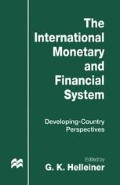Abstract
The early history of monetary and financial cooperation among developing countries in relation to the Bretton Woods institutions, the World Bank and the IMF, has been set out by Henning (1992). He observes that ‘the transformation of world politics and economics at the beginning of the 1990s presents new challenges for developing country cooperation in the Group of Twenty-Four’ (G-24). Specifically, market-based economic reform in the former Soviet Union and Eastern Europe, the easing of the international debt problem, and the triumph of ‘market-friendly’ policies everywhere, are viewed as posing ‘new problems of coalition formation among the developing countries’. The present paper seeks to explore some options for coalition formation that now confront the developing countries in the new situation. The first section of this paper reviews the working methods of the Group of Twenty-Four so far, and explores the potential for coalitions with both the smaller industrial countries, and the reforming economies of Eastern Europe. This is followed by an examination of the ways in which the interests of Japan and those of developing countries might converge during the 1990s, and the final section outlines a broad substantive agenda in the pursuit of which appropriate coalitions can be constructed on the principle that form must follow function.
Access this chapter
Tax calculation will be finalised at checkout
Purchases are for personal use only
Preview
Unable to display preview. Download preview PDF.
References
Ahmad, E. (ed.) (1991) Social Security in Developing Countries, WIDER Studies in Development Economics (Oxford: Clarendon Press).
Berrill, K. et al. (1990) ‘Foreign Portfolio Investment in Emerging Equity Markets’, WIDER Study Croup Series No. 5 (Helsinki).
Bruno, M. (1992) ‘Stabilization and the Macroeconomics of Transition — How Different is Eastern Europe?’, mimeo.
Chakravarty, S. et al. (1989) ‘World Economic Summits: The Role of Representative Groups in the Governance of the World Economy’, WIDER Study Group Series No. 4 (Helsinki).
Drèze, J. and A. Sen (1989) Hunger and Public Action, WIDER Studies in Development Economics (Oxford: Clarendon Press)
Fitzgerald, E.V.K. (1991) ‘Economic Reform and Citizen Entitlements in Eastern Europe: Some Social Implications and Structural Adjustment in Semi-Industrial Economies’, United Nations Research Institute for Social Development, Discussion Paper No. 27, June.
Henning, C.R. (1992) ‘The Group of Twenty-Four: Two Decades of Monetary and Financial Cooperation Among Developing Countries’, in International Monetary and Financial Issues for the 1990s, vol. t (Geneva: UNCTAD).
Jayawardena, L. (1991) A Global Environmental Compact for Sustainable Development: Resource Requirements and Mechanisms (Helsinki: WIDER/UNU).
Jayawardena, L. (1993) The Potential of Development Contracts and Conditionality: Towards Sustainable Development Compacts (Helsinki: WIDER/UNU).
Katz, S.S. (1991) ‘East Europe Should Learn from Asia: From Central Planning to a Market Economy’, Financial Times, 24 April.
Ndulu, B. (1987) Stabilization and Adjustment Policies and Programmes. Country Study No. 17: Tanzania (Helsinki: WIDER/UNU).
Netherlands (1991) A World of Difference: A New Framework for Development Cooperation in the 1990s, Ministry of Foreign Affairs, Development Cooperation Department (The Hague).
OECF (Overseas Economic Cooperation Fund) (1991) ‘Issues Related to the World Bank’s Approach to Structural Adjustment-Proposal from a Major Partner’, OECF Occasional Paper No. 1 (Tokyo), October.
Radwan, S. (1994) Outlook in Employment and Poverty Challenges and Scope for Employment — Intensive Growth Strategy Pre-conference Reader for Conference on Social Security and Poverty in preparation of the United Nations World Summit on Social Development, Copenhagen, 4–5 March (Maastricht).
Sachs, J. (1994) ‘How the IMF Pushed Russia to the Brink’, Sunday Times (Colombo), 30 January, reproduced from the New York Times.
Shiratori, M. (1993) ‘Role of Government in Development: A Critique of the World Bank Approach’, mimeo, Tokyo.
Stoltenberg, T. (1989) ‘Towards a World Development Strategy’, in L. Emmerij (ed.), One World or Several (Paris: OECD Development Centre).
United Nations (1991) ‘Progress Report on Financial Resources’, Report of the Secretary-General of the Conference. United Nations General Assembly Document for the Preparatory Committee for the United Nations Conference on Environment and Development, Third session, Geneva, 12 August-4 September (Document A/CONF.151/51, 5 July).
UNDP (1991) Human Development Report (Oxford).
UNDP (1992) Human Development Report (Oxford).
WIDER (1986) ‘The Potential of the Japanese Surplus for World Economic Development’, WIDER Study Group Series No. I (Helsinki).
WIDER (1987) Mobilizing International Surpluses for World Development: A WIDER Plan for a Japanese Initiative (Helsinki).
World Bank (1992) World Development Report 1991: The Challenge of Development (Oxford University Press).
Editor information
Editors and Affiliations
Copyright information
© 1996 UNCTAD
About this chapter
Cite this chapter
Jayawardena, L. (1996). Developing-Country Cooperation in International Financial Institutions. In: Helleiner, G.K. (eds) The International Monetary and Financial System. Palgrave Macmillan, London. https://doi.org/10.1007/978-1-349-24414-0_16
Download citation
DOI: https://doi.org/10.1007/978-1-349-24414-0_16
Publisher Name: Palgrave Macmillan, London
Print ISBN: 978-1-349-24416-4
Online ISBN: 978-1-349-24414-0
eBook Packages: Palgrave Economics & Finance CollectionEconomics and Finance (R0)

